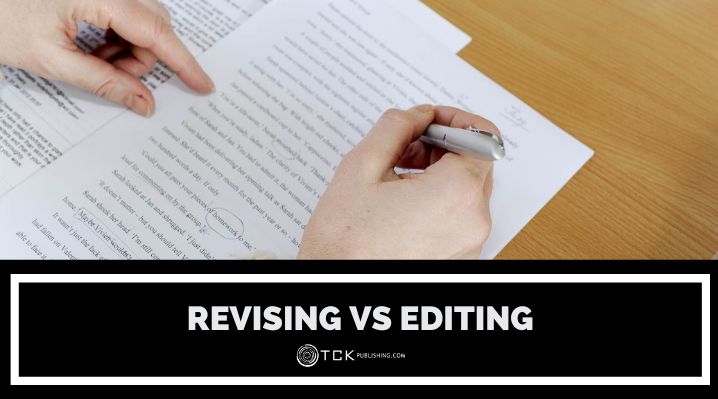
People tend to use “revising” and “editing” interchangeably. That’s fine in casual conversation but can cause confusion and ineffectiveness during the actual writing process.
To be fair, they are similar and often perceived as writing your story again—just better this time. However, both are separate steps in the writing process. They have important differences that require you to focus on different aspects of your writing.
Revising
Revising happens on a macro level. It’s when you finish your draft, take a step back, and consider the big-picture stuff.
This is where you change or strengthen a story by examining its critical elements. Anything you do here will affect the meaning of your work and how your audience experiences it.
The things you review during a revision are:
- character arcs
- story structure
- plot holes
- pacing
- exposition
- continuity
- themes, message, and purpose of your story
Some questions you might ask yourself would be:
- Are the characters interesting? Do they develop throughout the story?
- How smooth is the timeline of events?
- Does the story make sense?
- Is there a clear climax?
- Where do things get slow and awkward?
- Is the setting well-established?
- What unnecessary details need to be cut?
- Is the message clear?
- Are some details too broad or vague?
- Do you need to expand on some ideas?
- Does it come to a natural conclusion? Is the end satisfying?
At this stage, you’re role is still that of a writer. You focus on the story, how it unfolds, and what details to add or change to make it better for your readers.
Editing
Editing happens on a micro level after the big-picture stuff has been handled. This is where you go through your work to improve the technical quality of your draft.
When editing, the overall story doesn’t change. The only things you’re concerned with are the mistakes you’ve made while writing it.
The things you review during editing are:
- clarity
- sentence structure
- grammar
- spelling
- word choice
- punctuation
- descriptions
- point-of-view
- typos
- voice
- cohesion
- consistency
Some questions you can ask yourself are:
- Is there a sentence that is difficult to understand?
- Are all sentences grammatically correct and properly punctuated?
- Is there confusion on dialogue?
- Is your writing style, voice, and tone consistent?
- How well do sentences and paragraphs flow? Do they vary in length and style?
- Are terms and descriptions consistent?
- Is there any incorrect information?
- Is there any awkward phrasing or unnecessarily complex words?
Here, your role is more of a reader. You’re checking out how the story is being told and the issues that could distract other readers from enjoying it.
Who does which?
You, the writer, are the one who does revisions. Remember, a revision involves the fundamentals of a story. You’re its creator and the most qualified to make changes to it.
If you have them, consider the suggestions of your beta readers and critique partners. However, you do the bulk of the work and have the final word.
Ideally, you want someone else to do the editing. You’re too attached to your work and may, consciously or not, ignore or gloss over errors. A professional editor is experienced in fixing mistakes, giving actionable suggestions, and improving your draft.
There are also different kinds of editors. So make sure to understand exactly what you need help with. In general, find an editor who has an eye for detail, has great language skills, and isn’t afraid to give feedback.
It’s worth noting that a lot of writers self-edit for various reasons. It’s a valuable skill and all writers should take time developing it. The advantage with professional editors though, is that they’re already experts.
Conclusion
Put simply, revising is about improving the story itself while editing is improving its delivery. However, this difference can be blurry as the macro and micro elements of your story are intertwined.
Writing can be a messy process with interchangeable steps. Some people say to revise before you edit. There’s no sense in correcting errors if you’ll delete them later anyway. But others say to edit before you revise for the same reason. It boils down to what you prefer and want to prioritize.
Both steps take time, depending on the extent of rewrites needed. You also need to step away for a while to be able to look at your work with fresh eyes.
Impatience will only result in sloppy work. However many rewrites it takes to complete your work is the right amount of rewrites.
Keep in mind, however, that there comes a point where further rewriting only yields diminishing returns. When “improving” a draft becomes nitpicking, it is time to move on. You still need to submit and hopefully publish your work!
How do you revise and edit your work? Share your thoughts below!
If you enjoyed this post, then you might also like:
- Types of Editing: Knowing What You Need When
- Proofreading Your Book Post-Layout: How Editing After the Edit Can Save Your Story
- What Is Typesetting? Terms and Tips You Need to Know
- How to Find a Publisher for Your Book: Exploring All of Your Publishing Options

Cole is a blog writer and aspiring novelist. He has a degree in Communications and is an advocate of media and information literacy and responsible media practices. Aside from his interest in technology, crafts, and food, he’s also your typical science fiction and fantasy junkie, spending most of his free time reading through an ever-growing to-be-read list. It’s either that or procrastinating over actually writing his book. Wish him luck!
